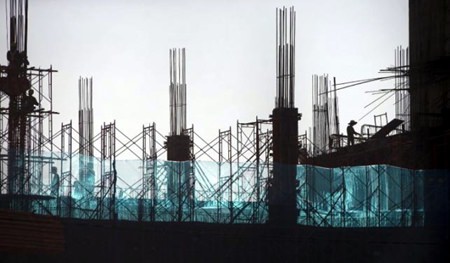Over the past several years, Myanmar’s economic capital of Yangon has enjoyed a flurry of real estate activity following the loosening of military rule and a gradual process of liberalisation. However, 2015 proved to be a fairly quiet period for the city’s real estate as the market cooled in the run up to November’s elections and the torrent of foreign investment slowed, causing office rents to slide and residential sales to come to a halt, according JLL, a professional services firm specializing in real estate.
“After peaking near US$100 per sqm per month in mid-2013, Grade A office rents have since tumbled by 35-40 percent as new supply has entered the market, yet despite the decline in rents, occupancy has fallen, most noticeably in existing projects,” explains Andrew Gulbrandson, Head of Research and Consulting for JLL Thailand who is responsible for coordinating much of the firm’s ongoing consultancy work in Myanmar.
 Workers are silhouetted on a building under construction in Yangon, Myanmar. (AP Photo/Gemunu Amarasinghe, file)
Workers are silhouetted on a building under construction in Yangon, Myanmar. (AP Photo/Gemunu Amarasinghe, file)
Observations by JLL shows most tenants have sought less expensive accommodations in newer non-prime buildings and other alternatives such as villas, hotels, and retail centres, while some have left the market,
“Based on feedback from our clients in the country, many occupiers are still in the wait-and-see mode adopted before the election. As a result, it’s likely that the first half of 2016 will be relatively quiet before activity picks up in the second half when the new administration is in control,” says Gulbrandson.
 Andrew Gulbrandson.
Andrew Gulbrandson.
Foreign investors have played an important part in the early development of Yangon’s real estate markets with investment coming from all over Asia; from well-known developers based in Singapore, Korea, and Japan to lesser known but equally impactful investors from Thailand, Hong Kong, China, and Vietnam. The market is also attracting investment from more global investors, including the International Finance Corporation (IFC), the private sector arm of the WorldBank.
To date, IFC has disclosed investments totaling almost US$200 million in project specific engagements such as the Shangri-La Hotel and Executive Residences as well as entity-level investments, such as the recent USD 25 million loan to CityMart – Myanmar’s leading supermarket operator.
“Based on recent discussions with clients, foreign interest across sectors in Myanmar is still very high. However, with numerous limitations in a number of sectors, but most pertinently, banking, we may see lower levels of foreign investment in 2016 than in previous years,” says Gulbrandson.
Looking ahead, Gulbrandson believes that 2016 will be a year of moderation and perhaps even stabilization in the city’s real estate market as a whole.
“Though many challenges remain, we believe the outlook for this dynamic landscape in 2016 to be positive,” says Gulbrandson.
“So far, the formation of the new government has been smooth, easing concerns over the post-election political uncertainty. Ongoing ambiguity over the structure of the new Government that has built up legislative backlog affecting a number of regulations should be eliminated when the new government is formed. Many business activities that have been held due to these concerns should resume and should help encourage demand in Yangon’s real estate market. In addition, a more cautious approach that investors and developers have taken should lead to a decline in future development project launches, allowing the existing supply to be gradually absorbed,” he explains. (Source: JLL Thailand)




